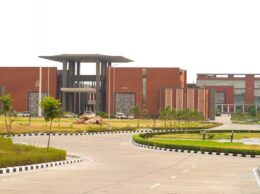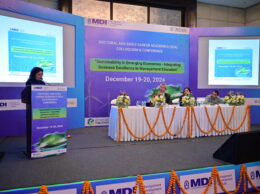MANDI : Indian Institute of Technology Mandi Researchers, as part of an international collaboration, have conducted a comprehensive analysis concluding that the extrusion-based metal additive manufacturing (metal AM) process stands out as the most superior and cost-effective method in comparison to other approaches in metal 3D printing.
Metal additive manufacturing utilizes fine metal powders to construct robust, intricate components through computer-aided design (CAD) programs or 3D scanning. This layer-by-layer manufacturing process offers flexibility in designing complex structures, finding applications in diverse industries such as aerospace, automotive, spare parts, heat sinks, biomedical devices, and construction materials.
The research team including Dr. Prateek Saxena along with his research scholars, Mr. Naveen Kumar Bankapalli, and Mr. Vishal Gupta, from IIT Mandi, Dr. Ankur Bajpai from University of Edinburgh, Dr. Christian Lahoda from Technische Universität Berlin, and Dr. Julian Polte, from Fraunhofer Institute for Production Systems and Design Technology, IPK, Germany, has meticulously detailed the extrusion-based process, termed mFFF/FDMet (metal fused filament fabrication/fused deposition of metals), in their publication in the journal Composites Part B.
Explaining the real-life application of the research, Mr. Naveen Kumar Bankapalli, Research Scholar, IIT Mandi, said, “This analysis empowers individuals, industries, or researchers to independently develop and implement this technology, facilitating cost-effective mass production of metal parts. Particularly noteworthy for aerospace applications due to its lightweight nature, the extrusion-based process outshines current metal additive manufacturing alternatives.”
While Powder Bed Fusion (PBF) and Direct Energy Deposition (DED) are popular metal additive manufacturing technologies, the extrusion-based method distinguishes itself by being more cost-effective, less hazardous, and offering greater design freedom. Employing unique filaments composed of polymeric additives and metal powder, the mFFF/FDMet technique allows for versatile shaping and avoids the hazards associated with fine metal powders in PBF and DED processes.
The five-step mFFF/FDMet method includes filament fabrication, additive manufacturing or 3D printing, debinding, sintering, and post-processing. Despite its lengthier process, it proves more economical for mass production of metal parts, in comparison to the conventional methods. This underscores the need for an accessible additive manufacturing system capable of producing metal samples quickly, inexpensively, and creatively.
While stressing the importance of adopting this novel technology, Dr. Prateek Saxena, Assistant Professor, School of Mechanical & Materials Engineering, IIT Mandi, said, “Currently, only foreign companies dominate this entire process, creating a monopoly. Our aim is to empower potential producers with a thorough understanding of the process, enabling independent development of the technology.”
The global metal 3D printing industry is gaining momentum, evident in initiatives like the US Air Force’s second AM lab for aircraft parts and Indian steel giants entering the fray. Recognizing the potential of additive manufacturing, the Indian government is committed to developing indigenous products for various sectors.
The researchers extensively discuss each step, materials, and potential challenges in the extrusion-based process, presenting a valuable resource for potential producers seeking to conduct cost-effective and efficient metal 3D printing based on insights gathered from global studies.









